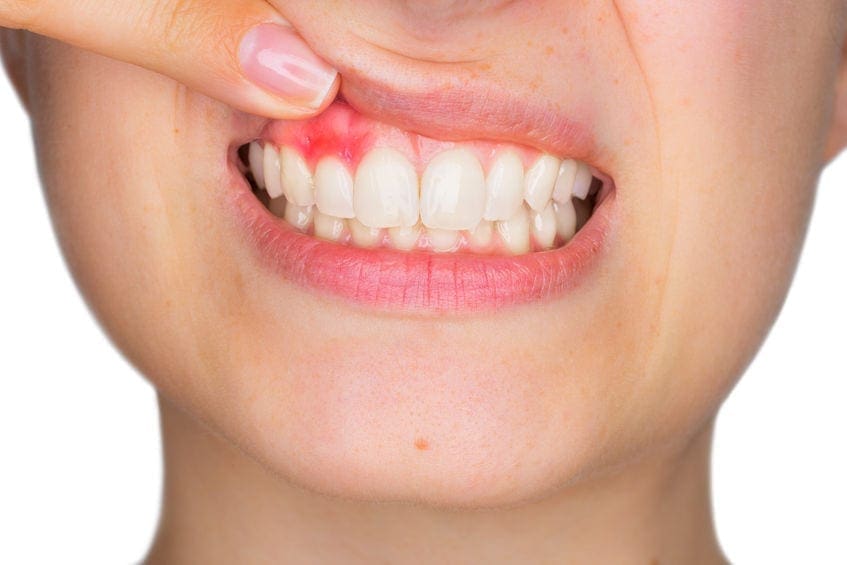Mouth sores, sometimes called canker sores are small red, mouth ulcers which are flat lesions, that develop in our mouths on gums, cheeks, lips, tongue or on the roof and bas of the mouth. These are painful and irritating, getting in the way of our day-to-day business of chewing, brushing and taking care of our oral health. These sores are quite common and most people get them at some point of their life. They are not contagious and they usually last for a week or two.
What causes mouth sores?
The common mouth sores are caused by virus, which has no cure as such. There are no clear-cut reasons behind the mouth ulcers, but there are factors which are believed to trigger them, including:
Family history
If your parents or close relatives have had mouth sores, then it is likely that this trait has been inherited by you from your parents. It runs in the family.
Fluctuations in hormones
Hormones are substances that are released in the blood stream directly from the glands designated to produce that particular substance called hormones. They are produced to meet some kind of task in the body during particular stage in the life cycle. But sometimes there is an overdose of the same, or more hormones are produced than the body can handle, it may result in different ways, one of which is sores in the mouth.
Allergies
Many times, mouth sores result from eating or drinking certain foods which produces allergic reaction in your mouth. It may be known or unknown to the person when he eats that particular food. Certain allergic food may come hidden in a dish about which you are not aware.
Stress
When you are going through a rough patch in life, there is a lot of stress which makes certain hormones to flow through. These sometimes result in mouth sores which will go away once stress is under control.
Menstrual cycle
Some women get mouth sores just before their menstrual flow is going to begin. This can be a result of hormones responsible for menstrual cycle.
Minor injuries
These can be caused by some dental work like orthodontic treatment. Sometimes you get hurt by accidental bruises by the equipment used by the dentist. At other times, when you are trying out new dentures, dental braces when they are fixed initially or even later on when they brush again it may scrape slightly with your cheeks or tongue, or the lower denture may touch the roof of the mouth and hurt it.
Broken tooth
When a tooth breaks into two, or more pieces, it can have sharp edges, which will hurt the cheeks or lips resulting in hurtful sores.
Certain foods
Some foods have lots of acidic content and brings about deep sores. The common fruits that are capable of producing sores in the mouth are pineapple, some berries, chocolate, and coffee.
Lack of minerals and vitamins
Minerals like iron, folate, zinc, calcium and vitamin B12, are important for oral health. Lack of these brings about helps mouth sores to erupt from time to time.
Bacteria in the mouth
Some bacteria that grow in the mouth cause some allergies in the mouth, resulting in infections. Some infections are caused by virus, or fungus.
Medicines
Certain medicines used for treatment of diseases like celiac disease, inflammatory bowel disease, or Bechet’s disease. Can cause mouth sores.
Malfunctioning immune system
The immune system which is not functioning properly may produce sores where it attacks mouth cells instead of what causes harm like malignant bacteria.
HIV/AIDS also can bring about mouth sores in patients.
Prevention of mouth sores
If you follow strict oral routine, then there will be reduced occurrence of mouth sores. Regular brushing and flossing are vital for preventing bacterial growth in the mouth which can result in mouth sores.
Certain lifestyle changes are also helpful in preventing sores in the mouth. Keep in mind the foods that you are allergic to. If possible, make a list of foods that brings on allergic reaction in your mouth. Whenever you are eating out make sure your host knows about it. Avoid these foods. Ask to see the ingredients of a particular dish if you are ordering it for the first time in a restaurant. Avoid eating very spicy foods.
Apply milk of magnesia on the sores to get some relief from the pain and faster healing. Warm water with a little baking soda added to it also helps in some respite from the pain. An antimicrobial or antibiotic mouth wash like Listerine and doxycycline can give some relief.
Eating ice cream and having a glass of cold milk may help. Cold foods soothe the hot surface of the sore and brings relief.
Ask your pharmacist to help you with medicines that is available without prescription to get relief from the pain. There are some over the counter products available for mouth sores.
Very hot foods tend to burn your tongue or insides of your mouth. Very cold foods also burn the inner surfaces. Avoid consuming very hot or very cold foods. It injures the surfaces of your mouth and result in sores.
Avoid eating very hard toffees. While trying to break this, you run the danger of breaking the food into uneven pieces, resulting in injury with the pointed piece of food. Sometimes hard and chewy foods injure your teeth and gums also, which may bring on lesions in the mouth.
Avoid using very hard toothbrush. Hard tooth brushes injure the gums ne base of the teeth which creates lesions on them.
While going through orthodontic treatment report any uneven hardware to your dentist so that it will not make any cuts in the mouth.
Do not use tobacco in any form. It is a known substance to cause irritation in the mouth which can bring about sores.
Drink lots of water to keep your mouth and body hydrated.

